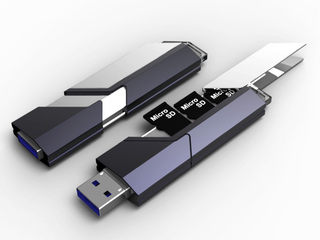Bank Technology On The Eve of Internet Revolution.
Published:
19 March 1999 y., Friday
CeBIT 1999 showcases Internet technologies that are about to transform Europe_s banking industry beyond recognition. Deutsche Telekom_s comprehensive showcase at CeBIT 99 includes a special focus on online Internet banking. T-Online and comdirect bank offer Internet newcomers a special banking technology package that includes access to T-Online at a reduced rate, a security deposit account with comdirect bank and free issues of stock exchange newspaper. One major signpost for radical change is the fact that online banking need not be serviced by established banks. Europe_s best-known high street banks are at a distinct disadvantage when contrasted with ISPs such as T-Online. Inflexible business methods, high staff overheads and costly infrastucture real estate bring little to online banking. The Internet is friendlier to brands which are easily accessible by the consumer and which can transfer themselves from one product to another. At the moment, most online customers use a PC to conduct business. But this is also set to change as digital TVs and set-top boxes enable people to manage their financial affairs for the comfort of the living room. In the future, mobile handheld datacoms products such as PalmPilots and smartphones will enable people to check their balances, pay bills and buy and sell investments while on the move. But before any of this can take place, both the banks and their customers must be absolutely certain that the transactions taking place are secure. This also applies to personal financial information being sent via the Internet. Siemens Nixdorf_s subsidiary SSE is an Irish-based company specialising in security aimed at this area. This year, this company_s entire new product range is focused on online security for the financial services industry in one form or another. TrustedDoc is aimed at providing a solution to a highly topical problem, digital signatures. SSE_s offers a number of solution-oriented products:
· TrustedMIME is an e-mail security plug-in for Microsoft Exchange, MS Outlook and Lotus Notes, designed to ensure the complete confidentiality of e-mail messages and file attachments.
· TrustedMIME/Corporate enables organisations to customise TrustedMIME for their own use.
· Trusted Web provides access control to sensitive data and applications, data confidentiality and simplified security administration.
SSE will also be showcasing a recent partnership with Swedish telco Telia. The two companies have together launched a new service, TeliaWebView WAN. This enables Telia and its data communication customers to exchange information securely and confidentiality via the Web, using Extranet technology.
Copying, publishing, announcing any information from the News.lt portal without written permission of News.lt editorial office is prohibited.
The most popular articles
Software company announced new structure_ of it_s business.
more »
 A new generation of smart phone "iPhone5" will go on sale in September.
more »
A new generation of smart phone "iPhone5" will go on sale in September.
more »
 The Collector USB Flash Drive is one awesome concept that I’d love to see on shelves.
more »
The Collector USB Flash Drive is one awesome concept that I’d love to see on shelves.
more »
 Internet Giant Google announced that they will be investing $168 million in a solar energy power plant being developed in the Mojave Desert by the startup BrightSource Energy.
more »
Internet Giant Google announced that they will be investing $168 million in a solar energy power plant being developed in the Mojave Desert by the startup BrightSource Energy.
more »
 New battery in your phone or laptop, that is charged hundreds of times faster.
more »
New battery in your phone or laptop, that is charged hundreds of times faster.
more »
 Facebook has announced that it will share the design secrets behind its new energy-efficient data centre with rival companies.
more »
Facebook has announced that it will share the design secrets behind its new energy-efficient data centre with rival companies.
more »
 The powerful new 15.6” ASUS-Automobili Lamborghini VX7 offers a completely revamped notebook experience...
more »
The powerful new 15.6” ASUS-Automobili Lamborghini VX7 offers a completely revamped notebook experience...
more »
 Moonwatch clock is designed to determine the relation between lunar cycle and human emotions.
more »
Moonwatch clock is designed to determine the relation between lunar cycle and human emotions.
more »
 Every year, Fortune magazine comes out with its list of the Most Admired Companies in the world.
more »
Every year, Fortune magazine comes out with its list of the Most Admired Companies in the world.
more »
 NASA's Messenger spacecraft delivers its first photos of Mercury and the first images ever taken from the rocky planet's own orbit.
more »
NASA's Messenger spacecraft delivers its first photos of Mercury and the first images ever taken from the rocky planet's own orbit.
more »
 What is the current role and likely future role of social media tools like Facebook and Twitter in framing European discourse?
more »
What is the current role and likely future role of social media tools like Facebook and Twitter in framing European discourse?
more »